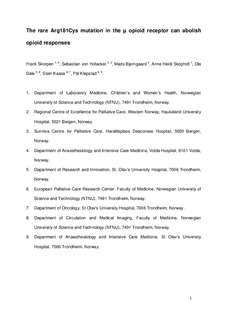| dc.contributor.author | Skorpen, Frank | |
| dc.contributor.author | von Hofacker, Sebastian | |
| dc.contributor.author | Bjørngaard, Mads | |
| dc.contributor.author | Skogholt, Anne Heidi | |
| dc.contributor.author | Dale, Ola | |
| dc.contributor.author | Kaasa, Stein | |
| dc.contributor.author | Klepstad, Pål | |
| dc.date.accessioned | 2017-11-14T08:55:33Z | |
| dc.date.available | 2017-11-14T08:55:33Z | |
| dc.date.created | 2016-08-23T14:02:55Z | |
| dc.date.issued | 2016 | |
| dc.identifier.citation | Acta Anaesthesiologica Scandinavica. 2016, 60 (8), 1084-1091. | nb_NO |
| dc.identifier.issn | 0001-5172 | |
| dc.identifier.uri | http://hdl.handle.net/11250/2466061 | |
| dc.description.abstract | BACKGROUND: Genetic variability contributes to variable clinical response to opioids. This study emerged from the observation of three Norwegian patients who showed no or extraordinary poor response to very high doses of opioids. We suspected a genetic defect and applied a 'most likely candidate gene' approach to investigate this possibility. METHODS: DNA sequencing was used to search for mutations in coding regions of the OPRM1 gene, encoding the μ opioid receptor (hMOR), in one patient. The remaining two patients, and two cohorts comprising 2158 European cancer pain patients and 600 Norwegian healthy volunteers, respectively, were genotyped using a custom-made TaqMan SNP allelic discrimination assay. RESULTS: DNA sequencing disclosed a homozygous, inactivating Arg181Cys mutation in hMOR in the patient who showed no effects from opioids. The two patients with poor effect from very high doses of opioids were both heterozygous for the mutation. Six heterozygous patients identified among the European cancer patients all used high doses of opioids and/or reported inferior effect on their pain. About one in every 100 Norwegians is heterozygous for the mutation. CONCLUSIONS: The Arg181Cys mutation occurs at clinically relevant frequencies and produces a signaling dead hMOR which may abolish or significantly reduce opioid effects in affected individuals. Anesthesiologists and practitioners in pain medicine should be aware of this mutation as a possible explanation for inefficiency of opioids and consider genotyping in relevant cases. Individuals homozygous for the mutation may need a highly personalized approach to pain therapy. | nb_NO |
| dc.language.iso | eng | nb_NO |
| dc.publisher | Wiley | nb_NO |
| dc.title | The rare Arg181Cys mutation in the μ opioid receptor can abolish opioid responses | nb_NO |
| dc.type | Journal article | nb_NO |
| dc.type | Peer reviewed | nb_NO |
| dc.description.version | acceptedVersion | nb_NO |
| dc.source.pagenumber | 1084-1091 | nb_NO |
| dc.source.volume | 60 | nb_NO |
| dc.source.journal | Acta Anaesthesiologica Scandinavica | nb_NO |
| dc.source.issue | 8 | nb_NO |
| dc.identifier.doi | 10.1111/aas.12739 | |
| dc.identifier.cristin | 1374884 | |
| dc.description.localcode | This is the peer reviewed version of the following article: [The rare Arg181Cys mutation in the μ opioid receptor can abolish opioid responses], which has been published in final form at [http://onlinelibrary.wiley.com/doi/10.1111/aas.12739/abstract]. This article may be used for non-commercial purposes in accordance with Wiley Terms and Conditions for Self-Archiving. | nb_NO |
| cristin.unitcode | 194,65,15,0 | |
| cristin.unitcode | 194,65,25,0 | |
| cristin.unitname | Institutt for klinisk og molekylær medisin | |
| cristin.unitname | Institutt for sirkulasjon og bildediagnostikk | |
| cristin.ispublished | true | |
| cristin.fulltext | original | |
| cristin.fulltext | postprint | |
| cristin.qualitycode | 1 | |
